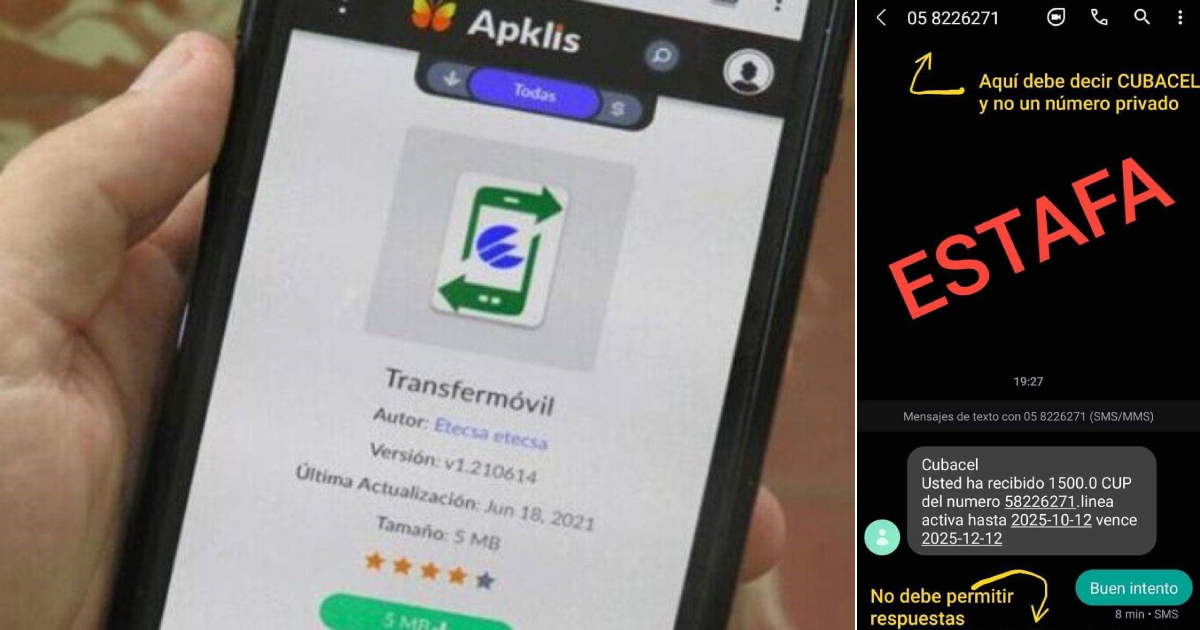Transfermóvil, the electronic payment application for mobile phones in Cuba, has issued a warning about a growing scam that mimics a recharge or balance transfer to a mobile phone by mistake, and then asks the supposed recipient to return the money. "Everyone, be alert. Recently, certain individuals have been sending SMS messages that appear to be from Cubacel, which usually notifies when a recharge or balance transfer is received, and then they call people to persuade them, saying it was a mistake and they need the money back. This is completely false," warned Transfermóvil's statement.
The alert was disseminated via the app's Telegram channel and has also been shared by profiles of state institutions, including banking entities. The scammers make victims believe that they mistakenly transferred a supposed amount of money and attempt to convince them to return it. Users who have reported these types of scams claim that the authorities do not take action when they receive the complaint, noted the website TecnologíaCuba, which echoed the recent alert from Transfermóvil.
According to the note, in the group associated with the Telegram channel, one user of the application commented, "They should do something about these scammers; the company has their data and can send it to the police." A report by the official newspaper 26 from Las Tunas included testimonies from people who have been targeted by this recurring scam in the country.
Scam Victims Share Their Stories
"Have you ever received an SMS claiming a supposed recharge or transfer and then someone calls explaining they made a mistake and need you to return the money?" the newspaper asked its readers. A man revealed that his mother was almost scammed this way, receiving an SMS stating they had mistakenly transferred 500 pesos; he warned, "You must be careful with these kinds of people."
Another reader shared that his daughter was also targeted, with scammers claiming to be in the hospital and urgently needing even 100 pesos back. However, the man acted immediately: "First, I checked the balance and, obviously, nothing had been transferred. Then I saw that the message wasn't from ETECSA. I realized it was just another scam."
The state-run Empresa de Telecomunicaciones de Cuba S.A. (ETECSA) has previously insisted that if someone receives a message about an erroneous transaction, they should check the last 10 operations made via Transfermóvil or Enzona to confirm whether the money actually entered their bank account or mobile balance.
To prevent such scams, Transfermóvil advises that "service SMS messages are not identified by private (personal) numbers and cannot be replied to; they are always under the name Pago por Móvil." It is crucial for phone line holders to know their balance or check it before making any transfers.
Additionally, as a precaution, experts recommend Transfermóvil users block the number if they receive such messages from a private number. ETECSA also recommends avoiding opening suspicious attachments, filling out forms, sharing dubious links, and responding to emails from unknown sources, as "these malicious programs can automatically generate calls, text messages, and connections."
According to the newspaper from Las Tunas, the population must stay vigilant against other possible scam modalities, as fraudsters have even spread fake gift offers or misleading advertisements from fake pages or profiles. There was also a false raffle promoted for International Women's Day, asking for an email address to notify how to receive the prize. During the registration process, the scammers would capture other personal data to later exploit it to steal digital money from their victims.
Recently, ETECSA has alerted customers about scam attempts involving fake money transfers due to the increase in cases of alleged monetary transactions made in error through the Transfermóvil app. In January, a Cuban shared a video on Facebook showing a "scam attempt recorded in real-time" during a MLC transaction through Transfermóvil.
Understanding Mobile Balance Scams in Cuba
Given the rise in scams targeting mobile phone balances in Cuba, it's essential to understand how these scams work and how to protect yourself. Here are some common questions and answers related to these fraudulent activities.
How do scammers trick you into returning money?
Scammers send an SMS that appears to be from Cubacel, claiming a recharge or balance transfer was made by mistake. They then call the recipient, persuading them to return the money, which was never actually transferred.
What should I do if I receive a suspicious SMS about a balance transfer?
Check your recent transactions via Transfermóvil or Enzona to verify if the money was actually received. Do not respond to the message, and consider blocking the number if it appears suspicious.
How can I protect myself from mobile phone balance scams?
Always verify your balance before making any transactions, avoid opening suspicious attachments or links, and do not share personal information with unknown sources. Use the official channels of communication provided by ETECSA and Transfermóvil.
